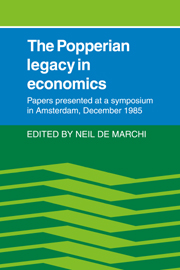Book contents
- Frontmatter
- Contents
- Preface
- List of contributors
- Introduction
- Discussion
- Part I Popper as a philosopher of science
- Part II Popper among the economists
- Part III Falsification and trying to do without it
- Part IV The missing chapter: empirical work and its appraisal
- Part V Non-Popperian perspectives on economics
- Index
- Frontmatter
- Contents
- Preface
- List of contributors
- Introduction
- Discussion
- Part I Popper as a philosopher of science
- Part II Popper among the economists
- Part III Falsification and trying to do without it
- Part IV The missing chapter: empirical work and its appraisal
- Part V Non-Popperian perspectives on economics
- Index
Summary
Hausman paper
Summary remarks
My thesis is that Popper's philosophy of science is a mess, and that Popper is a very poor authority for economists interested in the philosophy of science to look to.
I am not concerned with all of Popper's philosophy of science. My focus is on falsifiability, the idea that what distinguishes science from nonscience is that scientific claims are falsiflable and that there are certain rules of procedure which one can derive from the notion of falsifiability, which characterizes how a scientist should go about his business.
Popper employs two contradictory notions of falsifiability. Logical falsifiability is logical inconsistency with some set of basic statements. This gives rise to the asymmetry between verification and falsification and to Popper's insistence that we can never have reason to believe that theories are correct. All we can find out is that they are incorrect. In other passages, however, Popper maintains that we can only decide whether we are dealing with an empirical science by examining the methods the supposed scientists employ.
A serious difficulty with logical falsifiability is that any test requires background knowledge as well as basic statements. If we could rely on nothing but relations between theories and basic statements, no science would be possible.
Popper knows this and allows that we must combine our theories with auxiliary hypotheses, and from these larger “test systems” derive predictions which involve basic statements.
- Type
- Chapter
- Information
- The Popperian Legacy in EconomicsPapers Presented at a Symposium in Amsterdam, December 1985, pp. 17 - 62Publisher: Cambridge University PressPrint publication year: 1988



